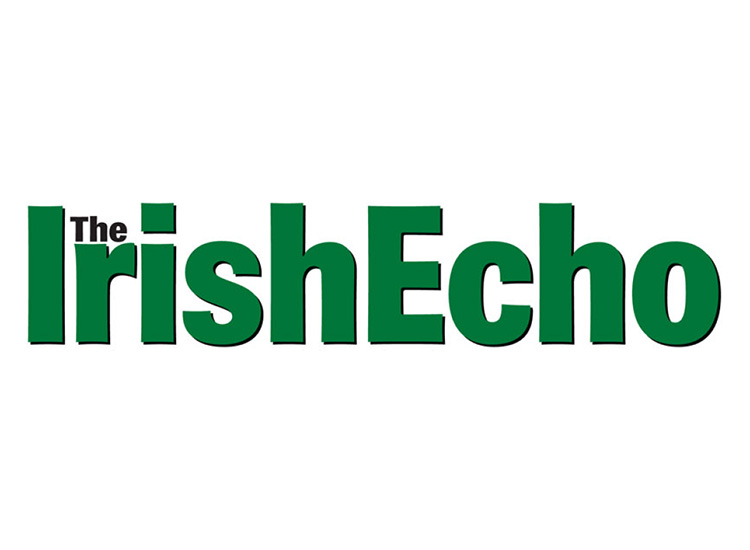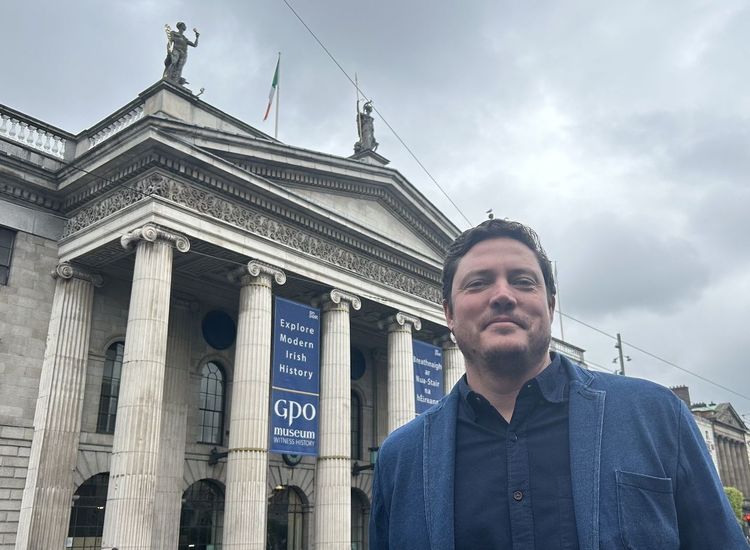Gerald A. Hanweck Jr., the CEO and founder of Hanweck, will speak tomorrow morning at the New York New Belfast conference at Pier A, Harbor House, Battery Place. He was pictured last Friday outside the New York Stock Exchange, which is close to his company’s headquarters at 30 Broad St. It has also has offices in Chicago and established its first overseas base in Belfast in 2015. PHOTO BY PETER MCDERMOTT
By Peter McDermott
Gerald A. Hanweck Jr. during his career has left not just one but two iconic American corporations – in both instances, when the company was getting to the next level.
First there was Microsoft, which in 1989 as a recent graduate he decided had already become too big with 500 or so employees. “That’s not really what I’d signed up for,” he said.
He repeated that sentiment when describing his later move from J.P. Morgan & Co. not long after it had merged with Chase Manhattan Bank at the turn of the millennium to become JPMorgan Chase, a giant in world banking.
In the case of that first departure, which led him back to university to study for his doctorate, Hanweck, it seems, is expected to make the perfunctory statement of regret.
“I kick myself for not sticking through with it and getting all the stock and stock options,” he said. But the CEO doesn’t look at all unhappy sitting in the offices of the company that bears his name on the 42nd Floor at 30 Broad St., in the Financial District in Downtown Manhattan.
Hanweck, says its website, “is the leading provider of risk analytics as-a-service with our real-time, data-enabled, global, cross-asset risk analytics platform.”
“Innovation, flexibility, ability to get things done quickly,” the CEO and founder said, enumerating some of the advantages that smaller operations can have. “Companies with big bureaucracies are not as nimble. You can’t take advantage of new technology, take an idea and run with it as easily.”
A smaller company can be on the cutting edge, which Hanweck has been with its key role at the intersection of computer science and quantitative finance.
Its founder said, “We were the first company to have a commercial product in the quantitative finance world that used GPUs [graphics processing units].
‘A real job’
“I grew up with finance and economics,” Hanweck said about his background. His father worked as an economist with the Federal Reserve System in Washington. “He’s still a finance professor,” he said of Gerald A. Hanweck Sr., who is also on the board of directors of his son’s company.
The younger Hanweck had always been interested in computer programming and after graduating from Princeton with a degree in mathematics, he interviewed for the company founded by Paul Allen and Bill Gates before it moved into its Redmond campus. When after a couple of years Microsoft no longer felt like an exciting start-up, a doctorate beckoned at the Kellogg Graduate School of Business at Northwestern University.
Searching around for a dissertation topic, he asked a friend of his father’s for some ideas. He had none, but suggested that the doctoral student work part-time for his brokerage firm. Hanweck had heard, however, through friends at the University of Chicago that doctoral programs didn’t permit its students to work and so he approached the dean with some trepidation.
“He looks pretty sternly at me and slaps the desk,” he recalled of the dean’s reaction, “‘Thank God, someone around here wants to go get a real job!’”
At that real job he met a few new mentors and when they all joined J.P. Morgan, the by-now Dr. Hanweck followed them. He spent 10 years there through 2003. “He served,” says his company’s website, “as Chief Equity Derivatives Strategist and led the bank's U.S. Fixed-Income Derivatives Strategy team.”
Although J.P. Morgan was a company with thousands of employees, a big history and its own bureaucracies, it still had a “small feel” and in Hanweck’s sphere, he could work with a degree of independence.
“We could be fairly innovative and nimble,” he said.
After leaving, he become involved in real estate development in Las Vegas, which was, he said, “enlightening in many ways,” and also profitable.
“While I did okay at it,” Hanweck remembered, “it wasn’t what I wanted to do long term.”
He did some consulting work back to companies like JPMorgan in partnership with Michael Hollingsworth, who is now Hanweck’s chief operating officer.
“Then one day I was playing around with some of the new graphics cards that Nvidia had put out — this was about late 2006,” Hanweck said. “And I’d been interested in graphics processing for compute for quite some time, but the hardware and software had never quite been to this point.”
He thought at the time: “Wow! I can run these options calculations on this graphic card, this thing you’d buy to play video games. I can run this 50 times faster.”
“Then I honed my code a little bit,” he continued, “and it’s 100 times faster than on the regular computer and I hone my code some more and it’s 200 times faster. This is pretty incredible!
“I knew from my own career that there would be demand for this kind of stuff,” Hanweck said, “stuff I would have wanted had it been available.”
So he and Hollingsworth decided that they’d build a company around it.
‘Powerful combination’
Hanweck products calculate in real time in the “monster” that is the American market. “It’s a million different options, 5,000 different underlying stocks, millions and millions of quotes a second. It’s a real computational problem,” the CEO said. “And so, that formed the basis of our product suite as it is today.”
He said of programming and quantitative financing, “bring the two together and it becomes quite a powerful combination.
“One of the things we’ve done as a firm is to bring together quant finance and computer science to solve these big problems,” Hanweck said. “They may be relatively easy computer science problems but they may be hard quant finance, or vice versa.”
Nvidia has gone on to make GPUs for self-driving cars, and is involved with much of what happening in the fields of artificial intelligence and deep learning. “They’ve made a very nice business for themselves,” Hanweck said. “We worked very closely with them in the early days and they told us ‘Yeah, you guys are the first ones out here.’
“Were other people doing something similar? Yeah, Bloomberg had real-time options data,” he added, “Most brokerage screens had some real-time options data. We chose a different path, which was to deliver the analytics as a service. And back in 2007, that whole as-a-service concept was still forming.
“We said we’re not going to put out screens. That would just be competing with Bloomberg or Reuters or one of these other big guys,” Hanweck said. “But if we can sell the analytics as a data stream, then customers could build that into their own platforms and use it. So we think that was pretty innovative.”
Transatlantic move
When looking for ways to expand globally and to service existing international clients, the company settled on Belfast in 2015 as the ideal place to set up an overseas office. Conor Allen, a friend and former colleague with roots there, recommended it initially, and the more Hanweck and Hollingsworth investigated the more they liked what they saw.
Hanweck, which has offices in Chicago, put together a team of four in Belfast. It’s now a team of eight and growing. The CEO added that Invest Northern Ireland was very helpful in the establishment of the office and has continued to be in the three years since.
“It’s a fabulous city. It’s got a really good technology talent pool. It’s got strong universities around it,” Hanweck said. “It’s got all of the things that you could want globally.”
He makes two or three visits a year, and it has become favorite destination for his family, too. He and his wife have taken their daughter, who’s 7, and son, 5, all over Northern Ireland, as well to Donegal and as far west as the Aran Islands.
With those deepening bonds comes the concern caused by Brexit – not so much for his own company, as it shouldn’t be overly affected, but notions of “hard borders” are by their nature worrisome.
“That would be a big step back for Ireland and I think Europe in general,” Hanweck said.










